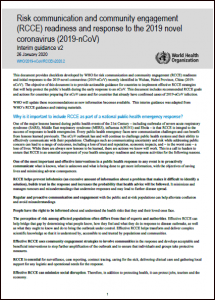Risk Communication and Community Engagement Guidance
This document provides WHO checklists for risk communication and community engagement (RCCE) readiness and initial response for novel coronaviruses (nCoV) recently identified in Wuhan, China (2019-nCoV).
The objective of this document is to provide actionable guidance for countries to implement effective RCCE strategies which will help protect the public’s health in the early response to nCoV. This document includes recommended RCCE goals and actions for countries preparing for nCoV cases and for countries that have confirmed -nCoV cases.
Guidance includes the following:
- RCCE helps prevent infodemics (an excessive amount of information about a problem that makes it difficult to identify a solution), builds trust in the response and increases the probability that health advice will be followed.
- People have the right to be informed about and understand the health risks that they and their loved ones face.
- The perception of risk among affected populations often differs from that of experts and authorities.
- Effective RCCE uses community engagement strategies to involve communities in the response and develops acceptable and beneficial interventions to stop further amplification of the outbreak and to ensure that individuals and groups take protective measures.
- RCCE is essential for surveillance, case reporting, contract tracing, caring for the sick, delivering clinical care and gathering local support for any logistic and operational needs for the response.
- Effective RCCE can minimize social disruption. Therefore, in addition to protecting health, it can protect jobs, tourism and the economy.
Last modified: July 21, 2020
Language: English

